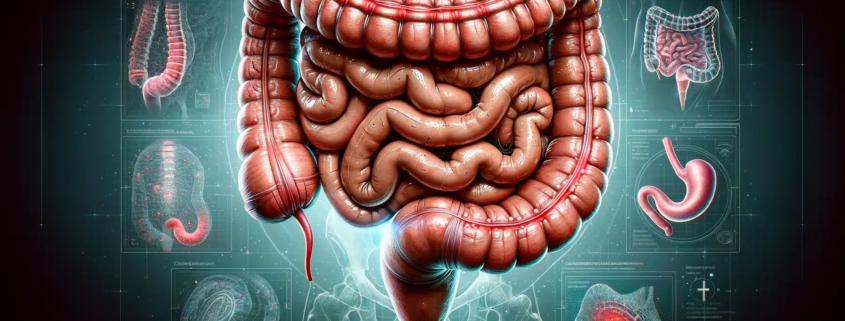20 Easy Daily Habits to Enhance Your Colon Health
Welcome to a journey of rejuvenation and resilience with Jonathan Bailor for your digestive well-being. We’re here to help you enhance your colon health and more! Imagine a daily routine that not only revitalizes your colon health but also integrates seamlessly into your life, bringing a sense of balance and vitality. This isn’t just about a diet or a fleeting trend; it’s about nurturing a relationship with your body that’s as attentive and caring as the one you have with your loved ones.
Let’s take care of your colon even more with our 21 Tips for Keeping Your Colon Healthy at Every Age and Your Guide to 28 Evidence-Based Treatments to Enhance Lower Colon Health guides!
Everyday choices have a profound impact on our health, and when it comes to maintaining the wellness of our digestive tract, consistency is key. You’re not alone if the complexity of health advice out there has ever left you bewildered. Here, we simplify it to the essence: tangible, daily actions that are easy to adopt and stick to, regardless of a bustling schedule or a demanding life.
These habits are not about rigorous changes or overwhelming your day with tasks; they’re small, powerful shifts that promise to support and maintain the vitality of your colon. Whether you’re looking to prevent colon cancer, reduce your risk of colon cancer, or prevent other colorectal issues and enhance your current health, these practices are designed to be inclusive, manageable, and effective.
As you read on, envision the difference these habits could make in your life. Imagine sharing this transformative knowledge with a friend over coffee or discussing these tips at a family dinner. It’s information worth passing on, for it speaks the universal language of health – a topic that resonates with everyone, everywhere.
Let’s embark on this path together, cultivating habits that not only promise a thriving digestive system but also empower you to take control of your overall health. Because a healthy colon doesn’t just mean a happier gut; it’s the cornerstone of a vibrant, full-bodied life.
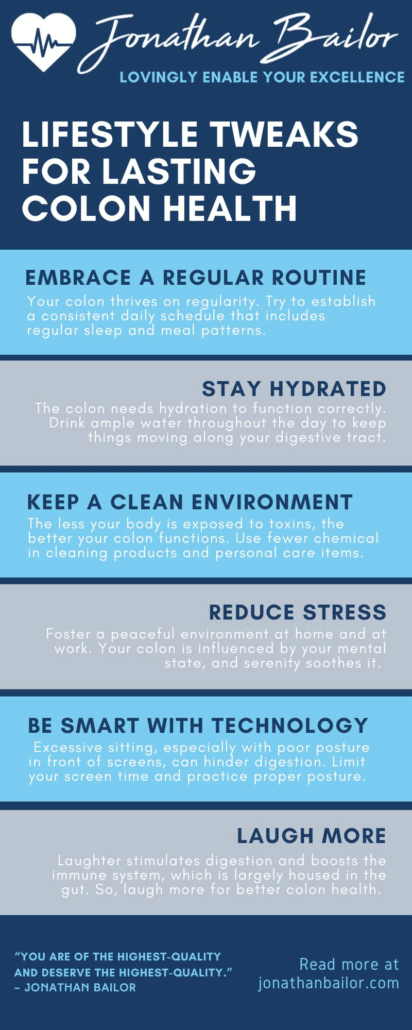
Feeling Better Is Priceless, That's Why We Don't Put A Price On It!
“It’s Like A Free and Medically Valid Version of Noom and Weight Watchers Online”
~ Dr. Doctor Matthew Oleshiak, MD
Click the 'LEARN MORE' button below for free lifetime access to the fast fix program developed by Jonathan and top Ivy League Medical Doctors
LEARN MOREP.S. It's not a free trial. It's not part of the program for free. The entire program is free, forever, for real! No credit card needed.
Lifestyle Tweaks for Lasting Colon Health
1. Embrace a Regular Routine
Your colon thrives on regularity. Try to establish a consistent daily schedule that includes regular sleep patterns. A body in harmony with its circadian rhythms can aid in smoother digestion and efficient waste elimination. As you align your waking, sleeping, and even your mealtimes, you’ll notice a comforting predictability in your body’s digestive processes.
2. Stay Hydrated with a Twist
While not directly related to diet, the role of hydration in healthy colon function is indispensable. Aim for ample water intake throughout the day to keep things moving along your digestive tract. If plain water doesn’t excite you, infuse it with natural flavors like cucumber or mint for a refreshing twist that tempts the taste buds and soothes the colon.
3. Cultivate a Clean Environment
The less your body is exposed to toxins, the better it can focus on internal processes, including digestion. Use natural cleaning products in your home and opt for personal care items with fewer chemicals. By reducing your exposure to harmful substances, you lessen the burden on your colon, allowing it to function at its best.
4. Minimize Stressful Situations
Stress can wreak havoc on your digestive system, leading to inflammation and disturbances in your colon. Foster a peaceful environment at home and work, and engage in calming activities that lower stress levels. Your colon does not exist in isolation; it’s influenced by your mental state, and serenity can be a soothing balm for your entire digestive system.
5. Practice Smart Technology Use
Excessive sitting, especially with poor posture in front of screens, can compress the abdomen and hinder digestion. Make conscious choices about your screen time and posture. Consider a standing desk or take frequent breaks to stretch and move around, giving your internal organs the space they need to function optimally.
6. Laughter as Medicine
Never underestimate the power of a good laugh on your overall well-being, including the health of your colon. Laughter stimulates digestion and strengthens the immune system, which is largely housed in the gut. So indulge in your favorite comedy show, joke with friends, and let laughter be a regular part of your wellness routine.
By intertwining these lifestyle habits into the fabric of your daily life, you lay down the foundation for a robust and resilient colon. These aren’t monumental tasks but rather simple switches or additions to what you already do, paving the way for a healthier tomorrow.
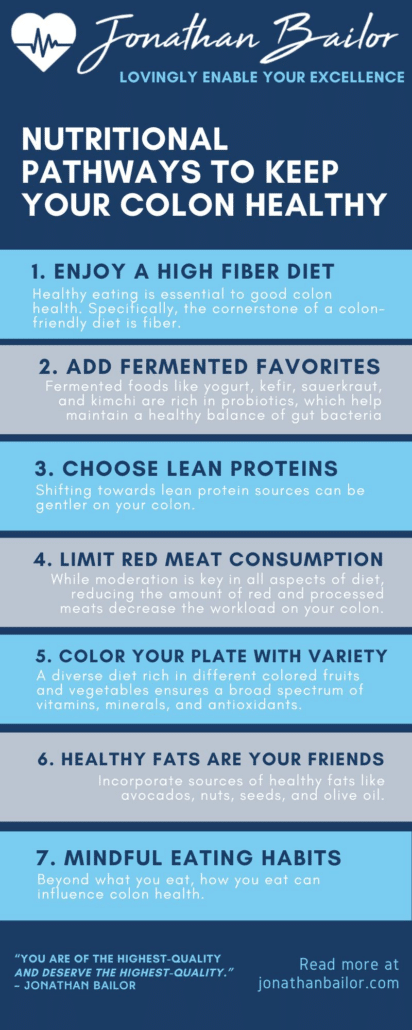
Nutritional Pathways to Keep Your Colon Healthy
1. Enjoy a High Fiber Diet
Healthy eating is essential to good colon health. Specifically, the cornerstone of a colon-friendly diet is fiber. Gradually increase your intake of high-fiber, low-fructose fruits, like berries and citrus fruits, and nonstarchy vegetables, like asparagus, cabbage, and broccoli. Fiber acts like a broom, sweeping through your colon and aiding in the efficient transport of waste. Remember to increase your fiber intake slowly to give your body time to adjust, and pair it with plenty of water to facilitate its beneficial effects.
2. Incorporate Fermented Favorites
Fermented foods like yogurt, kefir, sauerkraut, and kimchi are rich in probiotics, which help maintain a healthy balance of gut bacteria, crucial for a healthy colon. Introducing these tangy treasures into your diet can aid digestion, reduce inflammation, and strengthen your gut barrier, offering a tasty way to bolster your colon function.
3. Choose lean, Nutrient-Dense Proteins
Shifting towards lean protein sources can be gentler on your colon. Options like fish, poultry, and plant-based proteins provide essential nutrients without overwhelming your digestive system with excessive fats that are harder to break down and can strain your colon over time.
4. Limit Red Meat Consumption
While moderation is key in all aspects of diet, reducing the amount of red and processed meats can decrease the workload on your colon and reduce the risk of inflammation. Enjoy grass-fed red meat as an occasional treat rather than a staple, and your colon will thank you for the considerate respite.
5. Color Your Plate with Variety
A diverse diet rich in different colored fruits and vegetables ensures a broad spectrum of vitamins, minerals, and antioxidants, each playing a role in maintaining a healthy colon lining and preventing inflammation. This rainbow approach not only delights the palate but also provides a full range of nutritional support for your digestive tract.
6. Healthy Fats Are Your Friends
Incorporate sources of healthy fats like avocados, nuts, seeds, and olive oil. In addition, essential fatty acids like those found in oily fish are great for digestive and colonic health. These fats are not only essential for overall health but also help maintain the integrity of the gut lining and support the body’s inflammatory response, facilitating smooth transit and nutrient absorption in the colon.
7. Mindful Eating Habits
Beyond what you eat, how you eat can influence colon health. Take time to chew your food thoroughly, which aids in the breakdown of food and results in less work for your colon. Eating slowly and mindfully can also prevent overeating, reducing the risk of constipation and strain on your digestive system.
By making these dietary adjustments, you’re not just eating for the moment but nurturing a foundation of health that your colon can rely on. It’s a delicious investment in your long-term well-being, serving up a daily menu for vitality and vigor.
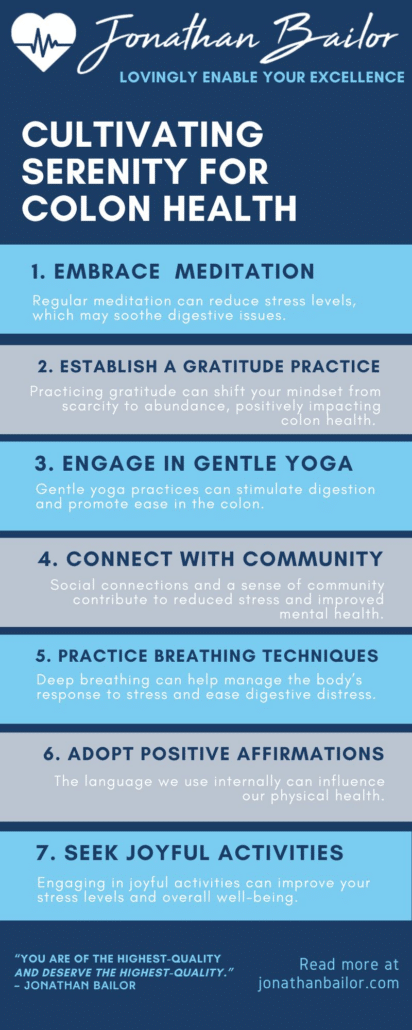
Cultivating Serenity for Colon Health
1. Embrace Mindfulness Meditation
Regular mindfulness meditation can significantly reduce stress levels, which in turn may alleviate stress-induced digestive issues. By sitting quietly each day, focusing on your breath, and bringing your attention back to the present whenever it wanders, you nurture a sense of calm that can soothe your entire digestive system.
2. Establish a Gratitude Practice
Cultivating gratitude can shift your mindset from one of scarcity to abundance, which can have a positive impact on your overall health, including your colon. Consider writing in a gratitude journal each night, reflecting on the aspects of your life that bring you joy and fulfillment.
3. Engage in Gentle Yoga
Gentle yoga practices, especially those incorporating poses that massage the abdomen, can stimulate digestion and promote ease in the colon. Poses like twists and forward folds can be particularly beneficial, as they encourage gentle movement in the gut area.
4. Connect with Community
Social connections and a sense of community contribute to reduced stress and improved mental health. By engaging with others, whether through community service, group activities, or shared interests, you create positive emotional experiences that can benefit digestive health.
5. Practice Deep Breathing Techniques
Deep, diaphragmatic breathing can help manage the body’s response to stress, which is often linked to digestive discomfort. By consciously deepening and slowing down your breath, you can trigger the body’s relaxation response, which may alleviate tension in the gut.
6. Adopt Positive Affirmations
The language we use internally can influence our physical health. By adopting positive affirmations that reinforce health and wellness, you can create a more supportive mental environment for your colon’s functioning. This practice can align your mental state with physical health goals.
7. Seek Joyful Activities
Regularly engaging in activities that bring you happiness can have a profound impact on your stress levels and overall well-being. Whether it’s painting, dancing, hiking, or playing music, these joyful pursuits can elevate your mood and, in turn, support a healthy, happy colon.
By intertwining these mental and spiritual practices into your daily routine, you’re not just nurturing your mind but also creating a harmonious environment for your colon to function optimally. It’s a holistic approach that honors the intricate connection between your emotional well-being and physical health.
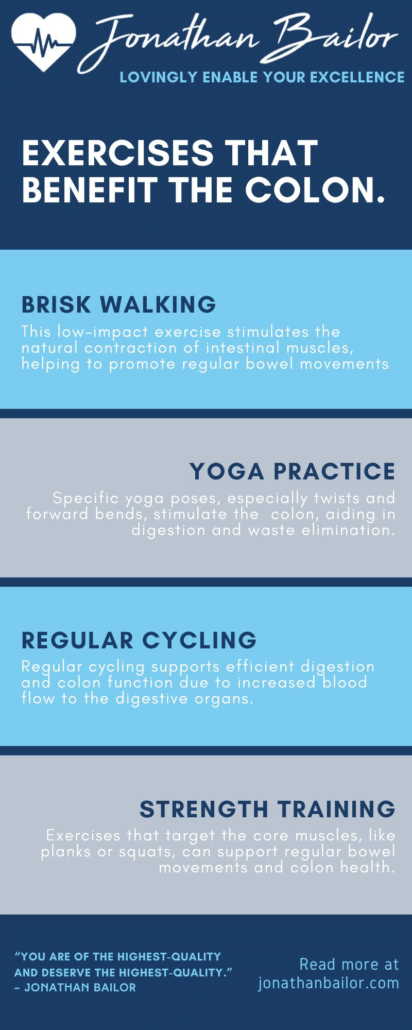
Understanding Colon Health: Your Questions Answered
What are common symptoms of lower colon health issues?
Symptoms can vary widely depending on the specific lower colon issue, but common signs include changes in bowel habits, such as constipation or diarrhea, abdominal pain, bloating, and blood in the stool. Persistent changes or discomfort warrant a discussion with a healthcare provider to rule out conditions like irritable bowel syndrome (IBS), inflammatory bowel disease (IBD), or even colorectal cancer.
Can diet really make a difference in lower colon health?
Absolutely, diet plays a crucial role in the health of the lower colon. Foods high in fiber, like low-sugar fruits and nonstarchy vegetables, can help ensure smooth bowel movements and prevent constipation. On the other hand, a diet high in processed foods and low in fiber can lead to various colon issues, including an increased risk of diverticular disease and even cancer.
Are there specific exercises that benefit the lower colon?
Exercise can be quite beneficial for colon health. Physical activity helps to stimulate intestinal contractions, which can promote more regular bowel movements. Brisk walking, hiking, dancing, and similar physical activities are particularly good for stimulating digestion and help keep the lower colon functioning correctly.
How important is hydration for maintaining a healthy lower colon?
Hydration is key to a healthy lower colon. Water helps to soften stool, making it easier to pass and reducing the risk of constipation. It’s also essential for the digestion and absorption of nutrients in the digestive tract. Aim for 8-10 glasses of water a day, but remember that needs can vary based on activity level, climate, and overall health.
What are the best preventative measures for lower colon health?
Preventative measures include maintaining a balanced diet rich in fiber, staying hydrated, exercising regularly, and avoiding excessive alcohol and tobacco use. Additionally, managing stress through relaxation techniques can improve gut motility and response. Regular screenings, such as colonoscopies, are also vital as they can detect precancerous polyps and other issues early on.
Maintaining the health of your lower colon is a combination of sensible dietary habits, regular physical activity, and attentive body awareness. It’s a lifelong commitment that can enhance not only your digestive health but also your overall quality of life.
Summary
In closing, caring for your lower colon is not merely about addressing issues as they arise; it’s about nurturing a cornerstone of your well-being. Remember, the steps we’ve explored together are not just for you—they’re wisdom to be passed along. If this guide has enlightened your path to health, imagine the impact it could have on others.
So please, share this knowledge with friends and family through social media or a thoughtful email. Spreading awareness is a gesture of care, one that could ripple out to touch many lives. Let’s make colon health a shared journey in wellness.
Feeling Better Is Priceless, That's Why We Don't Put A Price On It!
“It’s Like A Free and Medically Valid Version of Noom and Weight Watchers Online”
~ Dr. Doctor Matthew Oleshiak, MD
Click the 'LEARN MORE' button below for free lifetime access to the fast fix program developed by Jonathan and top Ivy League Medical Doctors
LEARN MOREP.S. It's not a free trial. It's not part of the program for free. The entire program is free, forever, for real! No credit card needed.

